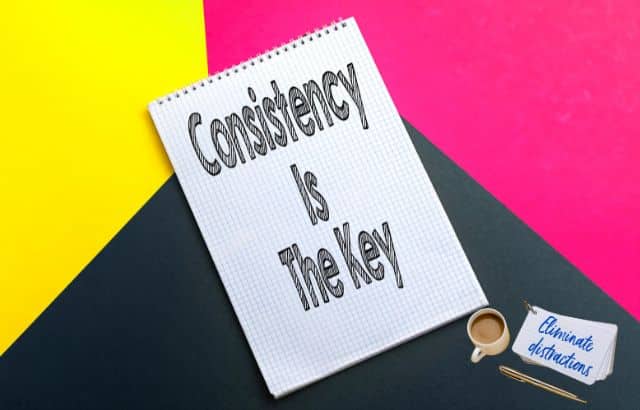Achieving your goals is a rewarding journey; however, it’s rarely a smooth one. Distractions and obstacles can often derail even the most well-laid plans. Nevertheless, maintaining consistency is crucial for success. In this blog post, we’ll explore effective strategies to help you stay on track and overcome the challenges that may come your way.
Table of Contents
Consistency with goals – Understanding the Challenge

Before diving into solutions, it’s important to first understand why staying consistent with your goals can be challenging. Distractions—ranging from social media notifications to unplanned interruptions—can easily divert your attention. Moreover, obstacles such as unexpected setbacks or personal difficulties can further hinder your progress. Therefore, the key is to anticipate these challenges and develop strategies to manage them effectively.
Strategies for Maintaining Consistency
Consistency with goals – Create a Structured Plan
A well-defined plan is your roadmap to success. Start by setting clear, achievable goals. Break them down into smaller, manageable tasks and create a timeline for completion. Having a structured plan helps you stay focused and makes it easier to track your progress.
Consistency with goals – Minimize Distractions
Your environment plays a significant role in your ability to focus. Designate a specific workspace where you can concentrate without interruptions. Use productivity tools or apps to limit access to social media and other digital distractions during work periods. Inform those around you about your focus times to reduce interruptions.
Consistency with goals – Set Clear Milestones
Milestones are critical for maintaining motivation. They provide you with a sense of achievement and help you measure progress. Celebrate these small victories to stay motivated and remind yourself that you are moving closer to your overall goal.
Develop a Routine
Consistency is easier to achieve with a routine. Establish a daily or weekly schedule that includes dedicated time for working towards your goals. Incorporate regular breaks and self-care to prevent burnout and maintain high levels of productivity.
Anticipate and Plan for Obstacles
Challenges are inevitable, but planning for them can make a big difference. Identify potential obstacles and develop contingency plans. This proactive approach helps you stay prepared and allows you to handle setbacks more effectively.
Seek Support and Accountability
Sharing your goals with others can provide motivation and accountability. Consider finding a mentor, joining a support group, or partnering with a friend who shares similar objectives. Regular check-ins with your accountability partner can help keep you on track.
Stay Flexible and Adapt
While consistency is key, flexibility is equally important. Be prepared to adapt your strategies as needed. If you encounter an unexpected challenge or if your initial plan isn’t working as well as you hoped, adjust your approach and keep moving forward.
Visual Reminders and Affirmations
Keep your goals in sight by using visual reminders. Place goal-setting notes or inspirational quotes in your workspace. Regularly remind yourself of the reasons behind your goals and the benefits of achieving them to maintain motivation.
FAQs Consistency with goals: Hirav Shah’s Advice

How can I maintain consistency with my goals despite distractions?
Answer: To maintain consistency, create a structured plan with clear milestones and minimize distractions by organizing your workspace and setting specific times for focused work. Regularly assess your progress and adapt your approach as needed.
What are effective strategies to overcome obstacles while pursuing goals?
Answer: Effective strategies include anticipating potential obstacles, having contingency plans, breaking goals into smaller tasks, and seeking support from mentors or peers. Stay flexible and resilient to adjust your strategies as challenges arise.
How can I stay motivated and consistent with my goals despite interruptions?
Answer: To stay motivated, set clear, achievable goals and celebrate small wins. Establish a routine that includes regular breaks and self-care, and remind yourself of the long-term benefits of achieving your goals. Use visual reminders of your goals to keep focused.
What role does setting specific goals play in managing distractions?
Answer: Setting specific goals helps to focus your efforts and prioritize tasks. Clear, actionable goals provide direction, making it easier to manage distractions by keeping you aligned with your objectives and minimizing the impact of interruptions.
How can I create a distraction-free environment to stay consistent with my goals?
Answer: To create a distraction-free environment, designate a specific area for work, limit access to digital distractions with productivity tools, and communicate your focus times to others. Keep your workspace organized and use techniques like time-blocking to enhance concentration.
How to Stay Consistent with Your Goals Despite Distractions and Obstacles Lets Plan with Hirav Shah

1. Create a Structured Plan
Example:
- Goal: Complete a professional certification within six months.
- Action: Outline a study plan that includes weekly study goals, practice exams, and review sessions. Use a calendar to schedule study times and set reminders for deadlines.
2. Minimize Distractions
Example:
- Goal: Write a novel.
- Action: Set up a dedicated writing space free from interruptions. Use apps like Freedom or Cold Turkey to block distracting websites and set specific times during the day for writing.
3. Set Clear Milestones
Example:
- Goal: Launch a new business.
- Action: Break down the launch process into smaller milestones such as market research, business plan completion, securing funding, and launching a website. Celebrate each milestone with a small reward.
4. Develop a Routine
Example:
- Goal: Improve physical fitness.
- Action: Create a workout schedule that includes exercise sessions at the same time each day. Incorporate variety in workouts and plan rest days to avoid burnout.
5. Anticipate and Plan for Obstacles
Example:
- Goal: Achieve a sales target.
- Action: Identify potential obstacles such as market fluctuations or supply chain issues. Develop contingency plans like diversifying your product range or finding alternative suppliers.
6. Seek Support and Accountability
Example:
- Goal: Learn a new language.
- Action: Join a language learning group or find a language exchange partner. Set up regular check-ins with a mentor or friend to review progress and keep motivated.
7. Stay Flexible and Adapt
Example:
- Goal: Complete a large project at work.
- Action: If an unexpected issue arises, such as a team member leaving, adjust your project timeline and reassign tasks. Be open to modifying your approach based on new information or challenges.
8. Use Visual Reminders
Example:
- Goal: Save for a vacation.
- Action: Create a vision board with images of the destination and your savings goals. Place it in a visible location to remind yourself of your objective and track your savings progress with a visual chart.
Conclusion

Staying consistent with your goals despite distractions and obstacles requires a combination of planning, organization, and resilience. By creating a structured plan, minimizing distractions, setting milestones, and staying adaptable, you can navigate challenges effectively and keep progressing toward your objectives. Remember, the journey to achieving your goals is as important as the destination. Stay focused, stay motivated, and you’ll find yourself closer to success.










